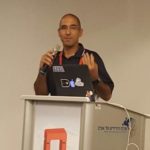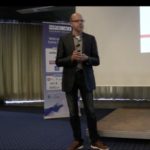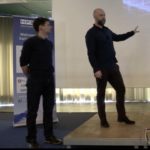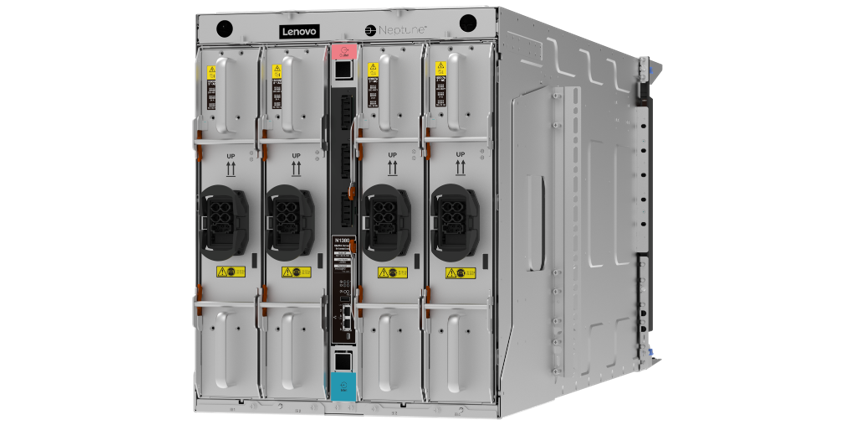Karsten Kutzer from Lenovo gave this talk at the 2018 Swiss HPC Conference. “This session will discuss why water cooling is becoming more and more important for HPC data centers, Lenovo’s series of innovations in the area of direct water-cooled systems, and ways to re-use “waste heat” created by HPC systems.”
Video: NVMe Takes It All, SCSI Has To Fall
Alexander Ruebensaal from ABC Systems AG gave this talk at the Swiss HPC Conference in Lugano. “NVMe has beome the main focus of storage developments when it comes to latency, bandwidth, IOPS. There is already a broad range of standard products available – server or network based.”
Designing Scalable HPC, Deep Learning and Cloud Middleware for Exascale Systems
DK Panda from Ohio State University gave this talk at the Swiss HPC Conference. “This talk will focus on challenges in designing HPC, Deep Learning, and HPC Cloud middleware for Exascale systems with millions of processors and accelerators. For the HPC domain, we will discuss about the challenges in designing runtime environments for MPI+X (PGAS – OpenSHMEM/UPC/CAF/UPC++, OpenMP, and CUDA) programming models. For the Deep Learning domain, we will focus on popular Deep Learning frameworks (Caffe, CNTK, and TensorFlow) to extract performance and scalability with MVAPICH2-GDR MPI library.”
Advanced Networking: The Critical Path for HPC, Cloud, Machine Learning and More
Erez Cohen from Mellanox gave this talk at the Swiss HPC Conference. “While InfiniBand, RDMA and GPU-Direct are an HPC mainstay, these advanced networking technologies are increasingly becoming a core differentiator to the data center. In fact, within just a few short years so far, where only a handful of bleeding edge industrial leaders emulated classic HPC disciplines, today almost every commercial market is usurping HPC technologies and disciplines in mass.”
Quantum Computing: Its Principles, Capabilities and Challenges
Dr. Mark Mattingley-Scott from IBM gave this talk at the Swiss HPC Conference. “Quantum Computing is here, right now – and we are at the start of a new way of computing, which will impact us the way the revolution started by Shockley, Bardeen and Brattain did in 1947. In this talk I will introduce Quantum Computing, its principles, capabilities and challenges and provide you with the insight you need to decide how you should engage with this revolutionary technology.”
Video: Building Computing and Data Centres for Exascale in the EU
In this video from the 2018 Swiss HPC Conference, Peter Hopton from the EuroEXA project shares the problems and the solutions that are being developed in the EuroEXA co-design project. “EuroEXA hardware designers work together with system software experts optimizing the entire stack from language runtimes to low-level kernel drivers, and application developers that bring in a rich mix of key HPC applications from across climate/weather, physical/energy and life-science/bioinformatics domains to enable efficient system co-design and maximize the impact of the project.”
Containers Using Singularity on HPC
Abhinav Thota, from Indiana University gave this talk at the 2018 Swiss HPC Conference. “Container use is becoming more widespread in the HPC field. There are various reasons for this, including the broadening of the user base and applications of HPC. One of the popular container tools on HPC is Singularity, an open source project coming out of the Berkeley Lab. In this talk, we will introduce Singularity, discuss how users of Indiana University are using it and share our experience supporting it. This talk will include a brief demonstration as well.”
Introducing the SPEC High Performance Group and HPC Benchmark Suites
Robert Henschel from Indiana University gave this talk at the Swiss HPC Conference. “In this talk, I will present an overview of the High Performance Group as well as SPEC’s benchmarking philosophy in general. Most everyone knows SPEC for the SPEC CPU benchmarks that are heavily used when comparing processor performance, but the High Performance Group specifically focusses on whole system benchmarking utilizing the parallelization paradigms common in HPC, like MPI, OpenMP and OpenACC.”
Ceph on the Brain: Storage and Data-Movement Supporting the Human Brain Project
Adrian Tate from Cray and Stig Telfer from StackHPC gave this talk at the 2018 Swiss HPC Conference. “This talk will describe how Cray, StackHPC and the HBP co-designed a next-generation storage system based on Ceph, exploiting complex memory hierarchies and enabling next-generation mixed workload execution. We will describe the challenges, show performance data and detail the ways that a similar storage setup may be used in HPC systems of the future.”
Scratch to Supercomputers: Bottoms-up Build of Large-scale Computational Lensing Software
Gilles Fourestey from EPFL gave this talk at the Swiss HPC Conference. “LENSTOOL is a gravitational lensing software that models mass distribution of galaxies and clusters. It is used to obtain sub-percent precision measurements of the total mass in galaxy clusters and constrain the dark matter self-interaction cross-section, a crucial ingredient to understanding its nature.”













